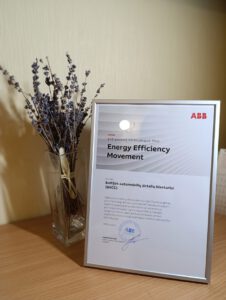2025-01-07, Vilnius
The Baltic Automotive Components Cluster (BACC) has become a member of the global Energy Efficiency Movement, an initiative launched by ABB to promote energy efficiency and sustainable practices across industries. This collaboration aims to enhance the competitiveness of the automotive sector in Lithuania and the Baltic states by sharing knowledge and implementing innovative solutions.
About Energy Efficiency Movement:
The Energy Efficiency Movement is a global initiative launched by ABB, bringing together organizations committed to reducing energy consumption and carbon emissions. It fosters collaboration, knowledge sharing, and the adoption of innovative energy-efficient solutions across various industries. With over 560 members worldwide, it aims to accelerate the transition to sustainable industrial operations.
Statements from Leadership:
- Diana Manko, Executive Director of BACC, emphasized the importance of this collaboration: “We believe that joining the Energy Efficiency Movement will enable us to provide greater value to our members by disseminating relevant information and fostering initiatives that enhance the competitiveness of the automotive industry in our region.”
- Justinas Pesliakas, Head of ABB’s Drives and Motors Business in Lithuania, welcomed BACC’s participation: “The inclusion of BACC in the Energy Efficiency Movement is a significant step towards strengthening our collective efforts to promote sustainable solutions in the industry. Together, we can implement innovative ideas that reduce energy consumption and increase competitiveness both locally and internationally.”
Sustainability Initiatives by BACC Members:
- Astra LT, one of Lithuania’s oldest metal processing companies, has implemented energy-generating building walls that produce approximately 120,000 kWh annually, reducing CO₂ emissions by about 55 tons per year.
- Hi-steel, a leading metal processing company in the Baltic states, has expanded its solar power capacity and plans to fully electrify its production and logistics equipment, aiming to significantly reduce fossil fuel consumption.

About Baltic Automotive Components Cluster (BACC)
The Baltic Automotive Components Cluster (BACC) is dedicated to fostering innovation, collaboration, and growth within the automotive and mobility sectors across the Baltic region. By connecting industry leaders, innovators, and experts, BACC creates a platform for the exchange of knowledge and drives the future of the automotive ecosystem.



